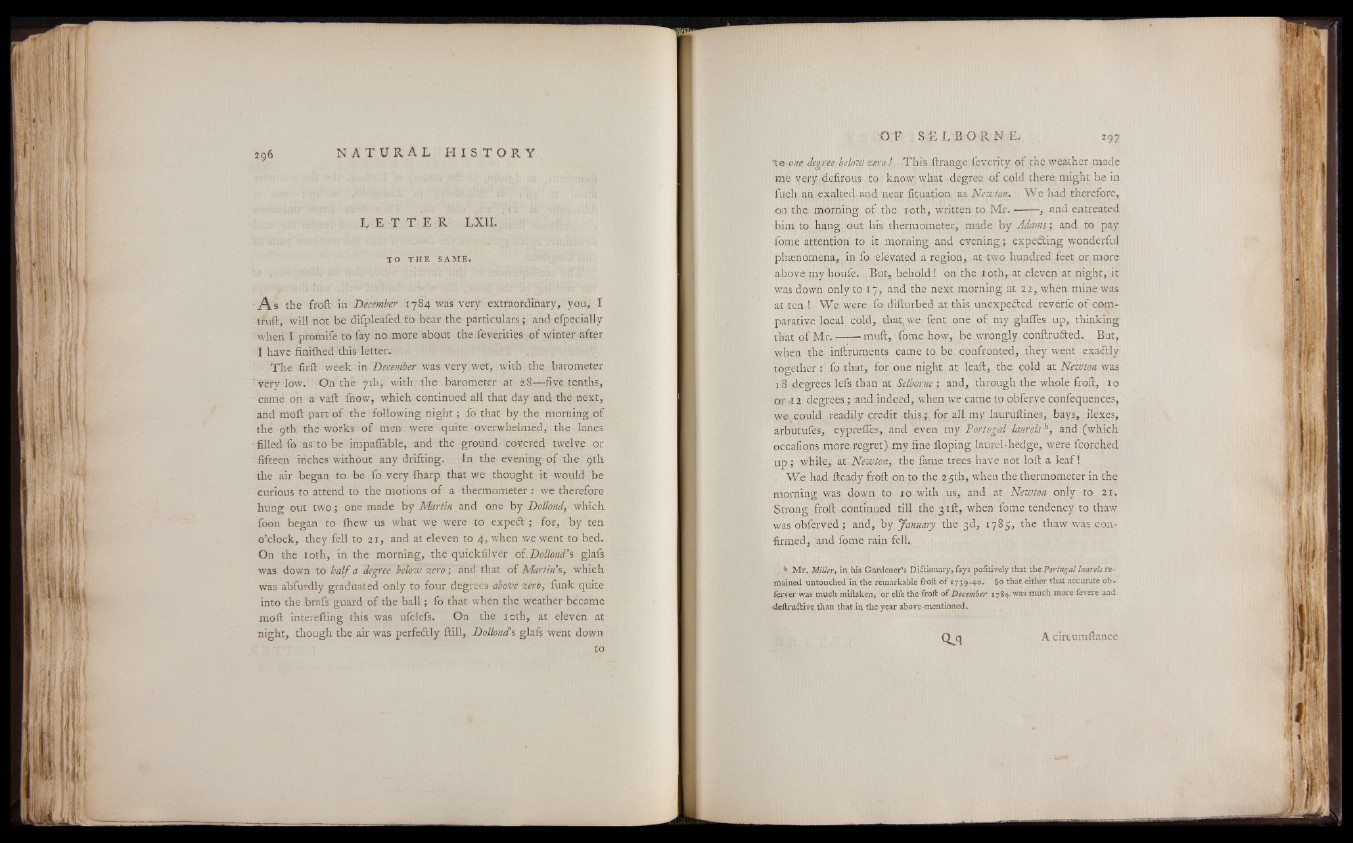
L E T T E R LX1I.
TO TH E S AM E .
A s the froft in December 1784 was very extraordinary, you, I
truft, will not be difpleafed to hear the particulars; and efpecially
when I promife to fay no more about the feverities of winter after
I have finilhed this letter.
The firft week in December was very wet, with the barometer
very low. On thé 7th,- with the barometér at 28— five tenths,
came on a vaft fnow, which continued all that day and the next,
and moll part of the following night; fo that by the morning of
the 9th the works of men were quite overwhelmed, the lanes
filled fo as to be impaflable, and the ground covered twelve or
fifteen inches without any drifting. In the evening of the 9th
the air began to be fo very lharp that we thought it would be
curious to attend to the motions of a thermometer : we therefore
hung out two; one made by Martin and one by Dollond, which
foon began to fhew us what we were to expeét; for, by ten
o’clock, they fell to 21, and at eleven to 4, when we went to bed.
On the loth, in the morning, the quickfilver of.Dollond’s glafs
was down to half a degree below zero; and that of Martin’s, which
was abfurdly graduated only to four degrees above zero, funk quite
into the brafs guard of the ball; fo that when the weather became
moft interefting this was ufelefs. On the 10th, at eleven at
night, though the air was perfectly flail, Dollond’s glafs went down
to
tS'tffff degree below zero! This ftrange feverity of the weather made
me very defirous to know; what degree of cold there might be in
fuch an exalted and near fituation as Newton. We had therefore,
on the morning of the 10th, written to M r .------, and entreated
him to hang out his thermometer, made by Adams; and to pay
fome attention to it morning and evening; expecting wonderful
phtenomena, in fo elevated a region, at two hundred feet or more
above my houfe. But, behold! on the 10th, at eleven at night, it
was down only to 17, and the next morning at 22, when mine was
at ten ! We were fo difturbed at this unexpected reverfe of comparative
local cold, that, we fent one of my glaffes up, thinking
that of Mr.------muft, (óme how, be wrongly conftruéted. But,
when the inftruments came to be confronted, they went exactly
together : fo that, for one night at lead, the cold at Newton was
18 degrees lefs than at Selborne ; and, through the whole froft, 10
or .t 2 degrees; and indeed, when we came to obferve confequences,
we could readily credit -this; for all my laurullines, bays, ilexes,
arbutufes, cyprelfes, and even my Portugal laurelsh, and (which
occafions more regret) my fine (loping laurel-hedge, were fcorched
up,; while, at Newton, the fame trees have not loft a leaf!
We had fteady froft on to the 2 5th, when the thermometer in the
morning was down to 10 with us, and at Newton only to 21.
Strong froft continued till the 31ft, when fome tendency to thaw
was obferved ; and, by January the 3d, 1785, the thaw was confirmed,
and fome rain fell.
ft M r , Miller, in his Gardener’ s Dictionary, fays politively that the Portugal laurels remained
untouched in the remarkable froft o f 1739-40. So that either that accurate ob-
ferver was much miftaken, or elfe the froft o f December 1784 was much more fevere and
deftruCtive than that in the year above •’mentioned.
Q-q A circumftance